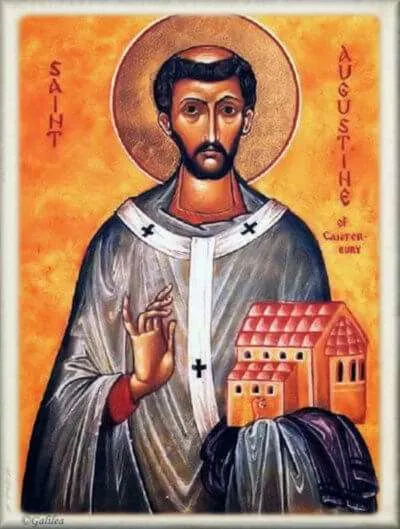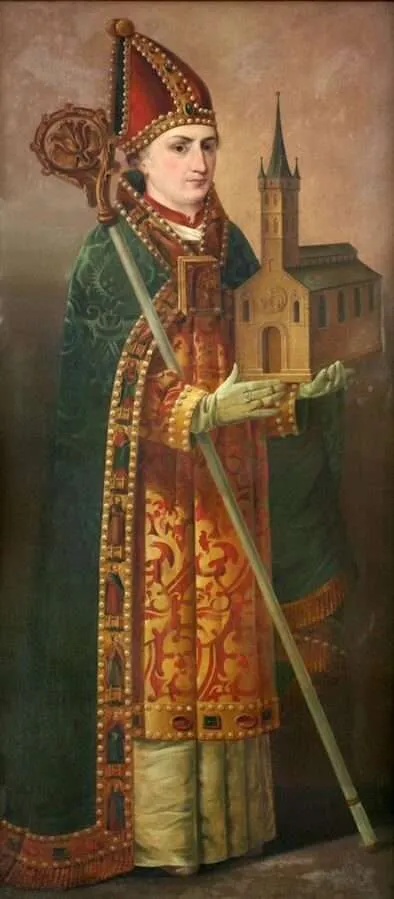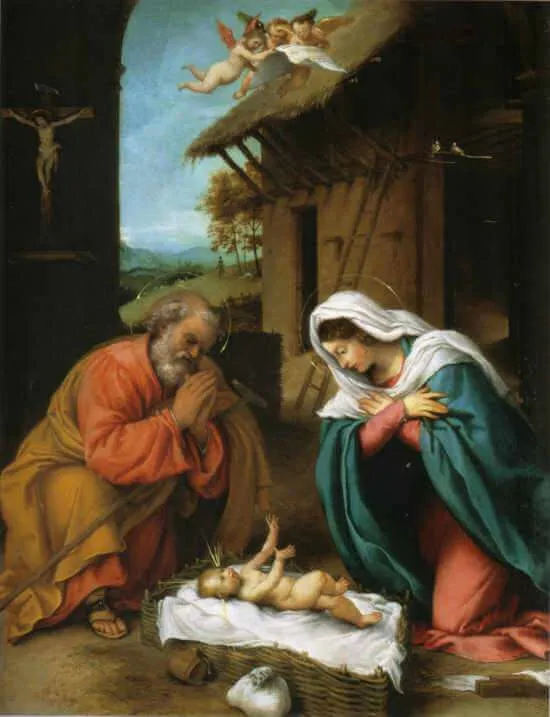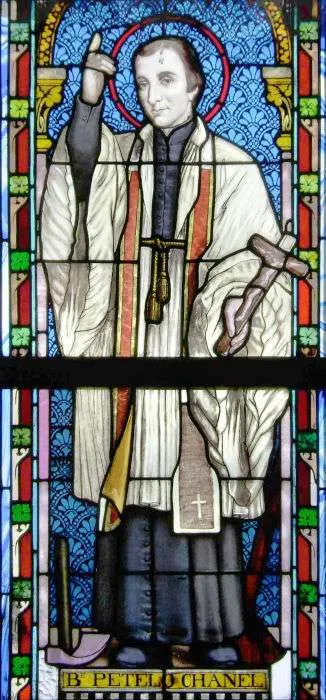Early Sixth Century–604; Patron Saint of England Pre-Congregation canonization
Shortly after the death and resurrection of our Lord, the Roman Empire launched its conquest of Britain. As the Romans slowly accepted Christianity, the faith began to trickle into pagan Britain. Once the empire legalized Christianity in the fourth century, the faith put down deeper roots in the conquered territory. In fact, one of the Church’s greatest saints, Saint Patrick of Ireland, was born and raised in Roman-Britain. In 410, Rome was sacked, the Roman Empire began to fall, and Roman troops were withdrawn from Britain. Soon after, the Angles and Saxons conquered the Britons, dividing their lands into nine smaller Anglo-Saxon kingdoms, all of which practiced some form of Germanic paganism. By the end of the sixth century, the young Christian nation had become a pagan one. The remaining British Christians retreated into small communities in the southeast part of what is now England and slowly became isolated from the Roman Church.
Around the year 595, Pope Saint Gregory the Great was said to have been walking through a Roman market when he came upon some young boys being sold as slaves. Out of concern for them, he inquired where the boys were from. “Angles from the isle of England” he was told. “Ah, they are angels!” he exclaimed. Seeing these pagan boys being sold as slaves moved the pope to take action. He wanted them Christian, and he wanted all of Anglo-Saxon England to be Christian. But how?
The pope’s first plan was to buy as many of the boys as possible, send them to monasteries where they could learn the Catholic faith, and if some were found worthy, ordain them as priests and send them back to their homeland to share the faith. However, this was a long-term plan, and the pope began to receive reports that the English were ready to convert if they only had missionaries to teach them the faith. Thus, the pope moved to plan B.
Prior to becoming the pope, Gregory was a Benedictine monk and converted his family home into the Abbey of Saint Andrew. At the time he became pope, Father Augustine was the abbey’s prior. Turning to the monks, Pope Gregory asked them to become missionaries to Anglo-Saxon England. Father Augustine was put in charge of the mission, and thirty to forty other monks were chosen to travel with him. Nothing is known about Augustine before his mission to England, but he was most likely born and raised in Rome in a noble family. Though his date of birth is unknown, he would have been advanced in years when he set out on his mission.
The monks’ objective was to go to King Æthelberht of the Kingdom of Kent, southeast England. King Æthelberht’s wife was a Christian and the daughter of Frankish King Charibert I. Before giving his daughter to Æthelberht in marriage, Charibert obtained Æthelberht’s agreement to allow his daughter to freely practice her Christian faith. Æthelberht’s wife brought a Catholic bishop to Kent with her to minister to her needs. This arrangement clearly softened King Æthelberht’s heart toward Christians.
Father Augustine and his entourage of monks set out from Rome, first stopping in the Frankish kingdom. They brought letters from the pope which enabled them to attain translators and supplies from the Frankish nobility. Some of the monks became fearful of continuing their journey because of stories they heard about the hostility of the Anglo-Saxons. As a result, Father Augustine returned to Rome to share the monks’ concerns with the pope. Pope Gregory listened to the concerns and reassured Father Augustine that God had willed their mission. The pope then named Father Augustine abbot of the monks, extending his authority over them, and sent him on his way. Encouraged by the pope, Abbot Augustine and the monks set out for the Kingdom of Kent. After the monks crossed the English Channel, King Æthelberht went out to meet them, welcoming them with open arms. He offered them a ruined church and gave them permission to convert as many people as they could. In less than a year, the king himself converted and was baptized. Elated with the news, Pope Gregory named Abbot Augustine as the first Archbishop of Canterbury. After receiving episcopal ordination in Arles, France, Bishop Augustine returned to Kent and enthusiastically continued his mission. On Christmas Day 597, Bishop Augustine baptized nearly 10,000 Anglo-Saxons.
For the next nine years, Bishop Augustine worked tirelessly to establish the Church among the Anglo-Saxons. With the help of the king, dioceses were created and many conversions followed. After wide-ranging consultations with the pope, Bishop Augustine carefully set forth his plan of evangelization. He also tried to reach out to the oppressed Britons who were still Christian but had retreated from formal union with the pope. These British Christians were unhappy that so much attention was given to the evangelization of their Anglo-Saxon conquerors, and Bishop Augustine had little success in gaining their support.
God performed many miracles through Bishop Augustine. When the pope heard about the many miracles, he wrote to Bishop Augustine, warning him not to allow those miracles to feed his pride. “I know, dearly beloved brother, that Almighty God, by means of you, shows forth great miracles…Therefore, you need to rejoice with fear, and fear with joy concerning that heavenly gift; for you will rejoice because the souls of the English are by outward miracles drawn to inward grace; but you will fear, lest, amidst the wonders that are wrought, the weak mind may be puffed up with self-esteem…” After ten years of ministry in England, Bishop Augustine knew his death was near. He prepared for his demise by choosing his successor and ordaining him a bishop. At the time of Augustine’s death, two other kings had received baptism, and after his death, the missionary activity continued. By the end of the seventh century, after a series of ups and downs, the kings of each of the kingdoms of Anglo-Saxon England converted, and their people followed.
Saint Augustine of Caterbury could have never imagined that he would one day become the patron saint of England. He was a holy monk, living a life of stability and prayer. But God called and he responded. Through his generosity and courage, countless conversions took place. Ponder your own generosity toward God. Are you ready and willing to say “Yes” to anything and everything God asks of you? Say “Yes” to Him today, and allow God the freedom to use you as He wills.
Source: https://mycatholic.life/saints/saints-of-the-liturgical-year/may-27—saint-augustine-austin-of-canterbury-bishop/







